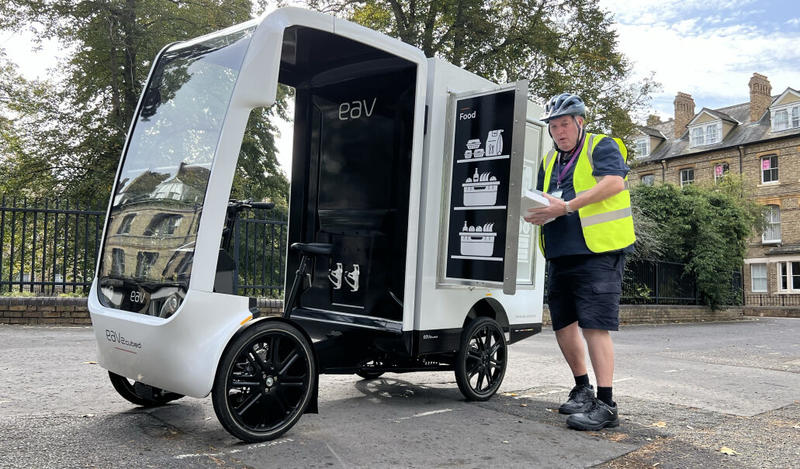The bike, made by EAV, helps users climb hills and enables speedier progress even while heavily laden, carrying up to 150kg at a time. It is also covered, providing staff with far better protection from the elements than traditional delivery bikes.
This will improve working conditions for staff as well as providing more flexibility by enabling those without a driving licence to take care of heavier deliveries.
The team hope that if it performs well during the week-long trial, it could ultimately replace one of the two electric vans they currently use for deliveries too heavy or too far away to go by bike. This would make a significant difference to emissions – according to the European Cyclists' Federation, electric bikes emit about 22g of CO2 per passenger kilometre, while for electric vans produce the average figure is around 89g – so changing to a cargo bike from a van could reduce emissions by around 75%. This will support delivery of the University’s environmental sustainability strategy, which includes a commitment to reach net zero carbon emissions and a positive overall impact on biodiversity by 2035. Staff would also enjoy the health benefits of increased exercise.

The cargo bike is far more agile and easier to park than a van, which could open up new routes and help reduce delivery times while also limiting the impact of the additional restrictions on motor vehicles that will be introduced soon on the team’s service.
Moving to electric bikes aligns with the City and County Councils’ goals around reducing motor traffic, reducing emissions and improving air quality. The new vehicle will be able to pass through the planned bus gates without being charged, enabling the team to continue working efficiently no matter how Oxford’s traffic management landscape changes over the coming years.
Finally, the bike costs considerably less to operate and maintain than the van, which should lead to long-term savings. Whether the team ultimately decide to move forward with it will depend on how it performs over the course of the trial, but this is an exciting opportunity to make meaningful improvements in several important areas.
The team provide a delivery and collection service for all colleges, departments and other parts of the University. They can also offer mail franking and other value-added services, which can typically save parts of the University that are still paying for their own franking machines a significant amount of money. If you would like to discuss any aspect of their service, please contact mail.services@admin.ox.ac.uk.